Welcome to Whitechapel: Happy Bangladesh Independence Day
From the News sheet of Tower Hamlets Council
Bengali language signage has been installed at Whitechapel Station to acknowledge the contribution of the Bangladeshi community to east London.
Mayor of Tower Hamlets John Biggs and the High Commissioner of Bangladesh Saida Muna Tasneem visited Whitechapel yesterday (Tuesday 15 March) to view the signage and tour the new-look station.
Tower Hamlets Council has funded dual language signs in English and Bengali outside and throughout the station. Transport for London (TfL) began installing the signs last week and is expecting them all to be in place by the end of April.
Having family connections to the area I went to have a look for myself.
Tower Hamlets has the biggest Bangladeshi community in the UK with around a third of residents of Bangladeshi heritage. Iconic areas and institutions near to Whitechapel station include Brick Lane and the East London Mosque. This year the borough has also been celebrating 50 years of independence for Bangladesh.
John Biggs, Mayor of Tower Hamlets, said:
“I am delighted that TfL has listened to our request to recognise the contribution our Bangladeshi community has made to Tower Hamlets and London as a whole.
“Whitechapel is one of London’s most famous places (for all the wrong reasons ~ Jack the Ripper and the Kray gang are not something of which I am particularly proud) and we are now creating a new history with developments including the Elizabeth Line and renovating the former Royal London Hospital building.
“Following our successful year of celebrations to mark 50 years since of Bangladeshi independence, it is fantastic that the signs have been installed in time for Bangladesh Independence Day on Saturday 26 March.”
Sadiq Khan, Mayor of London, said:
“London’s diversity is its greatest strength. The revamped signs at Whitechapel station recognise and celebrate the vital contribution Bangladeshi Londoners have made in shaping the community in Tower Hamlets and throughout our city. I’m delighted that they have been installed ahead of Bangladesh Independence Day on Saturday 26th March.
For years Whitechapel Station was dark and gloomy, and didn’t seem to have changed much since 1945, although it isn’t far enough underground to have been a bomb shelter. Then in more recent years it has been a building site, the platforms narrowed by boards behind which who knew what was going on.
Today it was open, new, bright, clean and shiny. Extra platforms for the new lines (Elizabeth Line which opens later this year and Crossrail) I looked about me for the new signage. I couldn’t see the sign I wanted most – “Toilets” because all that money spent, all that fanfare, and no public facilities for the traveller.
At the entrance I saw them.
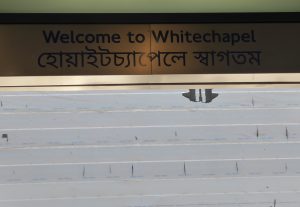
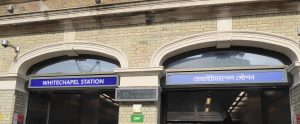
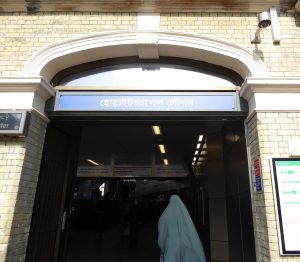
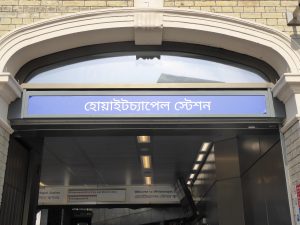
As you can see they look to be made of paper and cardboard pasted over the previous signs. Between Tower Hamlets Council paying for them, and Transport for London granting permission I expect the Council tax payers have been fleeced.
I carried on down Whitechapel wondering what the changes might be since my last visit (pre-lockdown) and hoping for wonders as promised by Sadiq Khan’s ” £11m Whitechapel Road Improvement Programme”. It seemed to be a series of new high rise office blocks; they may be nice when they are finished.

The East London Mosque has absorbed the building that was the Fieldgate Street Great Synagogue into its fabric as the office of the Bangla Television Channel; one would now never know that it was one of the last synagogues in Tower Hamlets, or of the brave resistance of the small congregation to resist the pressure to sell, but not forever. Photographs of the well kept and historic interior as it was in 2015 at time of sale here.
The former premises of the even older (albeit a business, not a place of worship, although it made many bells for churches) Whitechapel Bell Foundry are boarded up and looking sad and shabby. This business was started in 1570 and moved to the site in Whitechapel in 1740. It is expected to be converted into a hotel. The bell-making patents are now in the hands of another company operating near Stoke.
Public signs (usually, but not always also in English) in Bengali have been a feature of the Whitechapel area of Tower Hamlets for many years; so long that many of them are now quite rusty. When I was a child the area was the home of a large Jewish community. They never
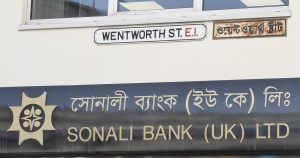
required signs in Hebrew and/or Yiddish; all but the oldest members of their families learnt English very quickly. But that was then; this is a new generation (three generations so far) of immigrants.
Free Sonali Bank (UK) App now available – Register and start sending money to Bangladesh with just a few clicks. Currently only available for those who hold British citizenship or a Biometric Residence Permit (UK).
 I then reached the churchyard of the ruins of St Mary Matfelon, which was the original White Chapel. That church was bombed during the war, finished off by lightening in the 1950s, became a public park, renamed Altab Ali Park after a young Bangladeshi man murdered in the 1970s. It contains a copy of the Shaheed Minar memorial, the original of which is in Dhaka.
I then reached the churchyard of the ruins of St Mary Matfelon, which was the original White Chapel. That church was bombed during the war, finished off by lightening in the 1950s, became a public park, renamed Altab Ali Park after a young Bangladeshi man murdered in the 1970s. It contains a copy of the Shaheed Minar memorial, the original of which is in Dhaka.
As Sadiq Khan and John Biggs mentioned earlier, this month is the 50th anniversary of Bangladesh independence. Not independence from the nasty, wicked, white colonial British Empire, but freedom from rule by their co-religionists and fellow South Asians in West Pakistan. And not just freedom, peace after a very nasty war (does it count as a Civil war?) fought during 1971 -72. A war where up to 3 million died and probably 400,000 Bengali women (Bangladesh means Free Bengal) were raped in what some commentators define as a campaign of genocidal rape. Pakistan’s religious leaders had declared that the women of Bengal/Bangladesh/East Pakistan were “gonimoter maal – Bengali for public property”. The official Pakistani Armed forces were augmented by the Islamist militia of the Jamaat-e-Islami who remain active to this day in their campaign to turn Pakistan into a Sharia Law state, and wage jihad though terror attacks in many countries, including Bangladesh.
I was at school at the time of what is also known as the Bangladesh Liberation War. I remember George Harrison’s fundraising Concert for Bangladesh and the Asian girls at my school holding a recital of traditional song and dance for the same purpose. I also remember reading a newspaper article from an aid team working with the rape survivors, many of whom were so badly maimed that pregnancy was the least of it. And the doctor saying how astoundingly young so many girls were. Little girls of 9 or 10 with internal injuries. At the time I couldn’t understand why little girls, prepubescent and without the attractions of a grown woman? At that time I had no idea of the predilection of the Islamic male for undeveloped girls. I know more now.
That was an odd ramble on a Monday morning, from tax payers money spent on the London underground to the genocidal rape of the Bangladesh Liberation War.
I can see parallels with what is happening in Ukraine. I can see a mindset which displayed itself in Rotherham and Rochdale.
Nothing happens in a vacuum.